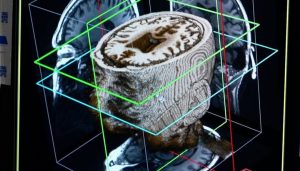In a world in which people fear both dementia and Artificial Intelligence (AI), a strange confluence of these two forces is shaping up, with humankind clearly benefiting. Worldwide, around 50 million people have dementia, with nearly 60% living in low- and middle-income countries, according to the World Health Organization (WHO). The WHO also states that the “estimated proportion of the general population aged 60 and over with dementia at a given time is between 5-8%,” and the “total number of people with dementia is projected to reach 82 million in 2030 and 152 in 2050.” In fact, dementia and its associated forms of brain degenerative diseases are the sixth leading cause of death in the United States, just slightly behind strokes.
And though there are many hurdles to overcome, AI may help us combat this debilitating, and ultimately, deadly disease. Prof Zoe Kourtzi, of Cambridge University and a fellow at The Alan Turing Institute, is optimistic saying, “If we intervene early, the treatments can kick in early and slow down the progression of the disease and at the same time avoid more damage. And it’s likely that symptoms occur much later in life or may never occur.”
Kourtzi’s approach relies on comparing brain scans of those worried they might have dementia with those of thousands of dementia patients and their relevant medical records. Using an algorithm developed by AI allows a computer to identify essentially hidden patterns that neurologists would miss using conventional methods. Although the research is only in the pre-clinical phase at Addenbrooke’s Hospital and other memory clinics around the UK, the process “. . .has been able to diagnose dementia, years before symptoms develop, even when there is no obvious signs of damage on the brain scan.”
Dr. Laura Phipps at Alzheimer’s Research UK explains that to “. . . diagnose dementia today, doctors need to rely on the interpretation of brain scans and cognitive tests, often over a period of time. Machine learning models such as those being developed by Prof Kourtzi could give doctors greater confidence in interpreting scans, leading to a more accurate diagnosis for patients.”
Dr. Timothy Rittman, a senior clinical research associate and consultant neurologist at the University of Cambridge, who is leading the study, highlighted the importance of this recent development: “These set of diseases are really devastating for people,” he said. “So when I am delivering this information to a patient, anything I can do to be more confident about the diagnosis, to give them more information about the likely progression of the disease to help them plan their lives is a great thing to be able to do.”

This is a crucial step in terms of treatment and prognosis. A major report by Alzheimer’s Disease International (ADI) prepared by the Institute of Psychiatry, Kings College London has found that “. . . in high-income countries only 20-50% of people living with dementia are recognised and documented in primary care.”
This delay in diagnosis could mean the difference with regard to not only intervention but the overall quality of life. As reported by the Social Care Institute for Excellence, “An early diagnosis opens the door to future care and treatment. It helps people to plan ahead while they are still able to make important decisions on their care and support needs and on financial and legal matters. It also helps them and their families to receive practical information, advice and guidance as they face new challenges.”
In a parallel fashion, The University College London’s(UCL) Institute of Healthcare Engineering was able to use AI to develop an algorithm that can diagnose a specific disorder a patient is suffering from. The algorithm, known as SuStaIn (Subtype and Stage Inference), rapidly interprets MRIs (magnetic resonance imaging) of the brains of patients dealing with Alzheimer’s and Frontotemporal dementia and is able to display the specific parts of the brain where neurodegeneration (death of neurons) is occurring, allowing medical professionals to classify the distinct subgroups of both Alzheimer’s and Frontotemporal dementia. All of this means developing detailed interventions and treatment plans in a proactive manner.
This research into the application of AI to dementia is part of a broader effort by doctors and researchers to harness the power of machine learning in the service of improving the health outcomes of people. As the recent article Artificial Intelligence in Dementia Research points out, “Often inspired by models of human neural networks, AI has recently transformed the fields of computer vision, image analysis, natural language processing, automation and robotics. By harnessing recent developments in computing infrastructure and processing power, AI has set new state-of-the-art benchmarks for performance, generated new innovations in engineering and steadily become part of the mainstream of science and technology.”
According to Emerj, an AI company whose mission is “Mapping what’s possible and what’s working in artificial intelligence in order to help leaders develop winning AI strategies,” the majority of AI applications for predicting dementia appear to fall into four major categories:
- Speech Monitoring: Companies are using machine learning to analyze speech patterns to detect and monitor dementia progression.
- Medical Image Analysis: Companies are developing software using machine learning to analyze brain deterioration from scans to help predict the onset of dementia.
- Visual Indicators: Companies are training algorithms to assess eye movement patterns to track and correlate cognitive function and brain activity.
- Genetic Analysis: Companies are using machine learning to analyze genetic data to predict the onset of dementia.
One of the cutting-edge organizations dedicated to using AI to ameliorate the effects of dementia is The Deep Dementia Phenotyping Network (DEMON). Their website states, “We are the international network for the application of data science and AI to dementia research” which “brings together academics, clinicians and other partners from across the world.”
One of DEMON’s major research projects is Decode Dementia, which is investigating the multidimensional application of AI to understanding and treating dementia. A major advantage of AI over traditional diagnosis is its capacity to crunch large sets of data and variables in order to identify complex patterns associated with the disease. As Dr. David Llewellyn, a Senior Research Fellow in Clinical Epidemiology at the University of Exeter Medical School, explains:
It’s a very difficult clinical challenge assessing patients who you may not know well and who are concerned about their memory and thinking, and trying to work out whether they are just ageing normally as no two cases of dementia are exactly alike. If you’re a non-specialist, you may not have seen a patient with a particular combination of signs and symptoms before. So one of the advantages of DECODE, a machine learning-driven system, is that it can learn to recognise patterns in hundreds, thousands, potentially millions of dementia cases and work out what needs to happen clinically to benefit that patient. So it’s the idea it doesn’t get tired or distracted and it’s very consistent.
Not surprisingly, a diagnosis of dementia causes incredible stress and often triggers negative emotions. A major report on the benefits of early diagnosis shows that a diagnosis is often greeted with severe shock, with feelings of disbelief, anger, loss and grief. However, an early and accurate diagnosis is one of the best weapons the medical community has at its disposal to combat dementia.
Norman McNamara, who was recently diagnosed with dementia, put it eloquently: “An early diagnosis of dementia is so, so important. Once diagnosed, I knew what I was up against. As they say: know your enemy. If I hadn’t been diagnosed early and I hadn’t been seen by consultants on a regular basis, I wouldn’t be as well as I am today. I don’t know what my future holds, but at least I’m prepared for it.”
And though we are in the nascent stage of investigation and much more work needs to be done, for Norman and the millions of others who live with, or will be diagnosed with a form of dementia, AI may represent a key component in unlocking future treatments that will make dementia a thing of the past.
At Newsweed.com, we adhere to three simple principles: truth, balance, and relatability. Our articles, podcasts, and videos strive to present content in an accurate, fair, yet compelling and timely manner. We avoid pushing personal or ideological agendas because our only agenda is creating quality content for our audience, whom we are here to serve. That is why our motto is ”Rolling with the times, straining for the truth.”
Your opinion matters. Please share your thoughts in our survey so that Newsweed can better serve you.
Charles Bukowski, the Los Angeles beat poet that captured the depravity of American urban life once said, “There is something about writing poetry that brings a man close to the cliff’s edge.” Newsweed is proud to stand in solidarity and offer you a chance to get close to the cliff’s edge with our first Power of Poetry Contest. Are you a budding bard, a versatile versifier, a rhyming regaler? Do you march to the beat of iambic pentameter, or flow like a river with free verse? If so, here’s your opportunity to put your mad poetic chops to the test. Enter our poetry contest for bragging rights and an opportunity to win some cash!






